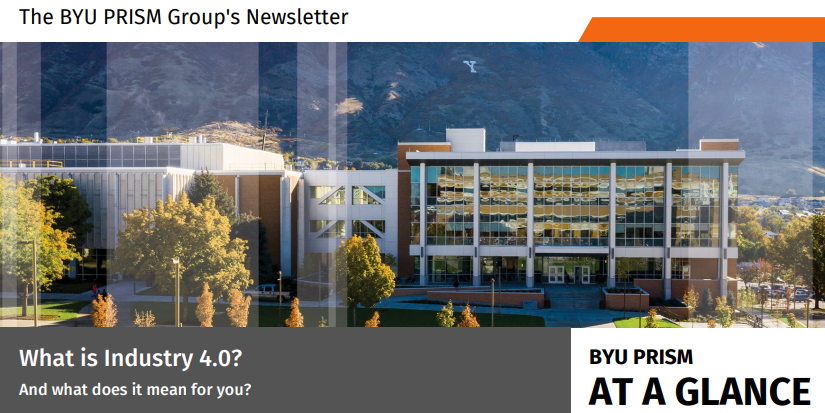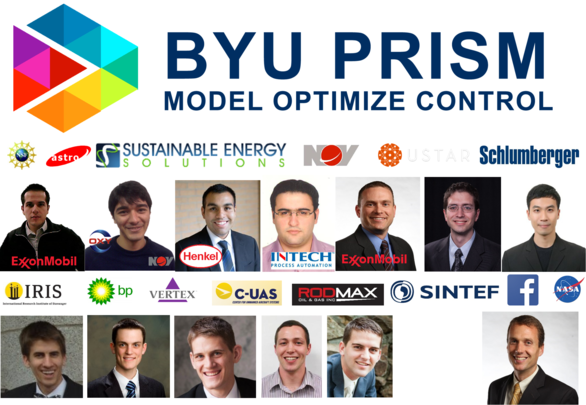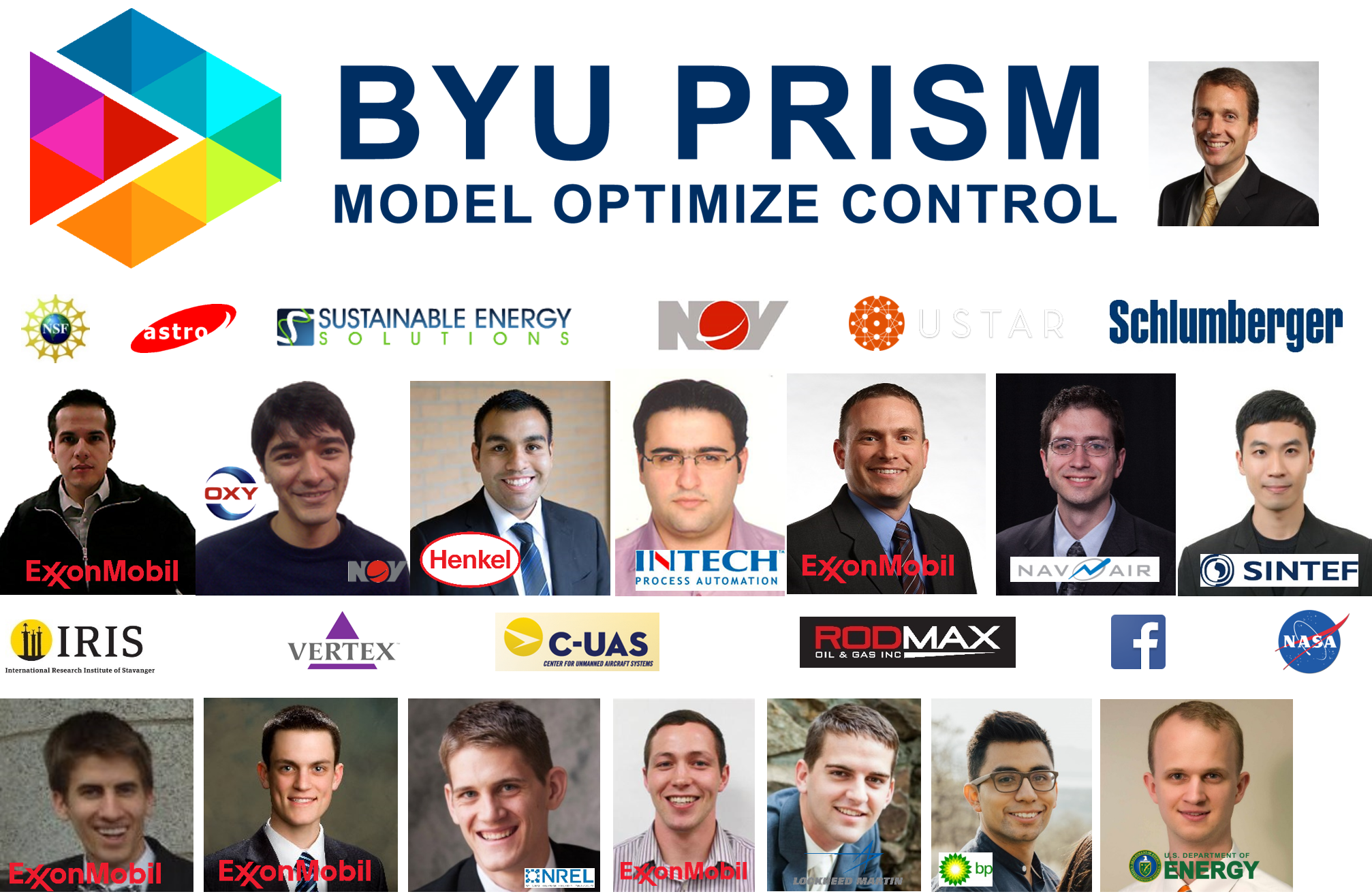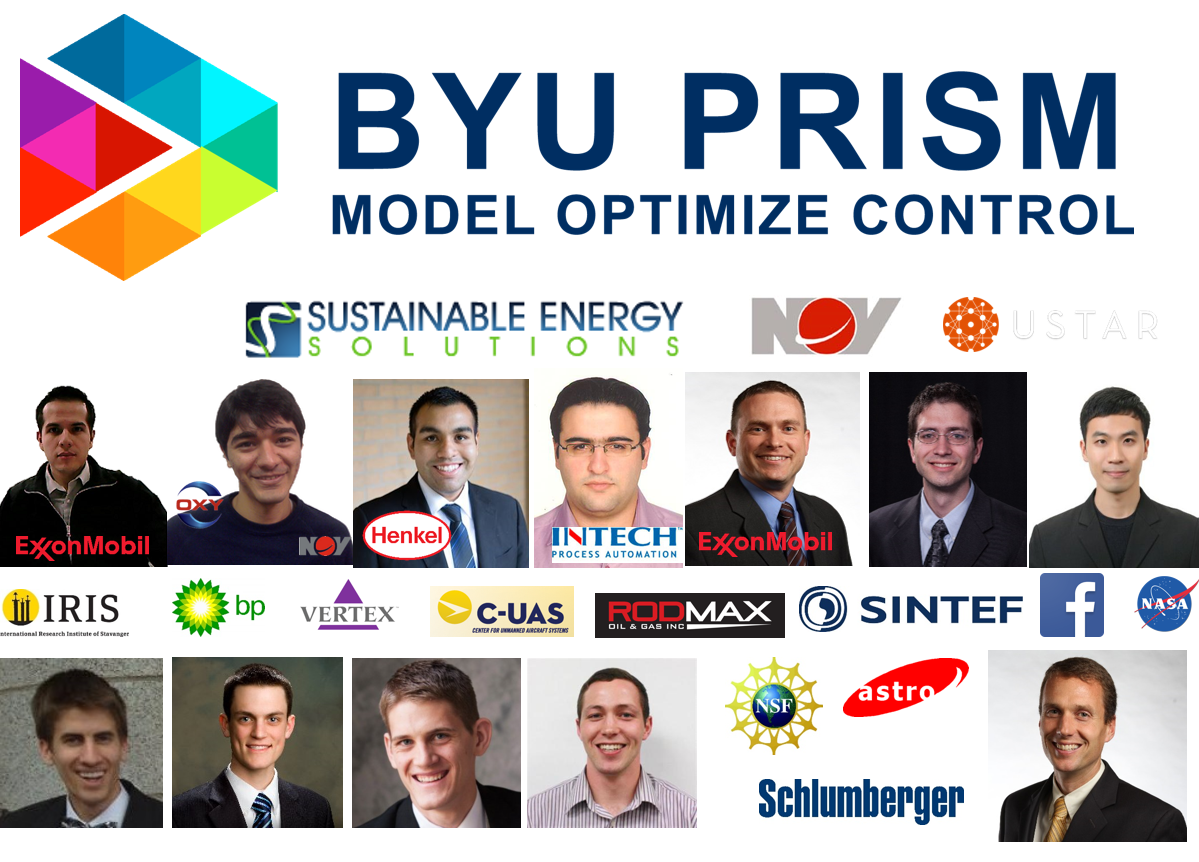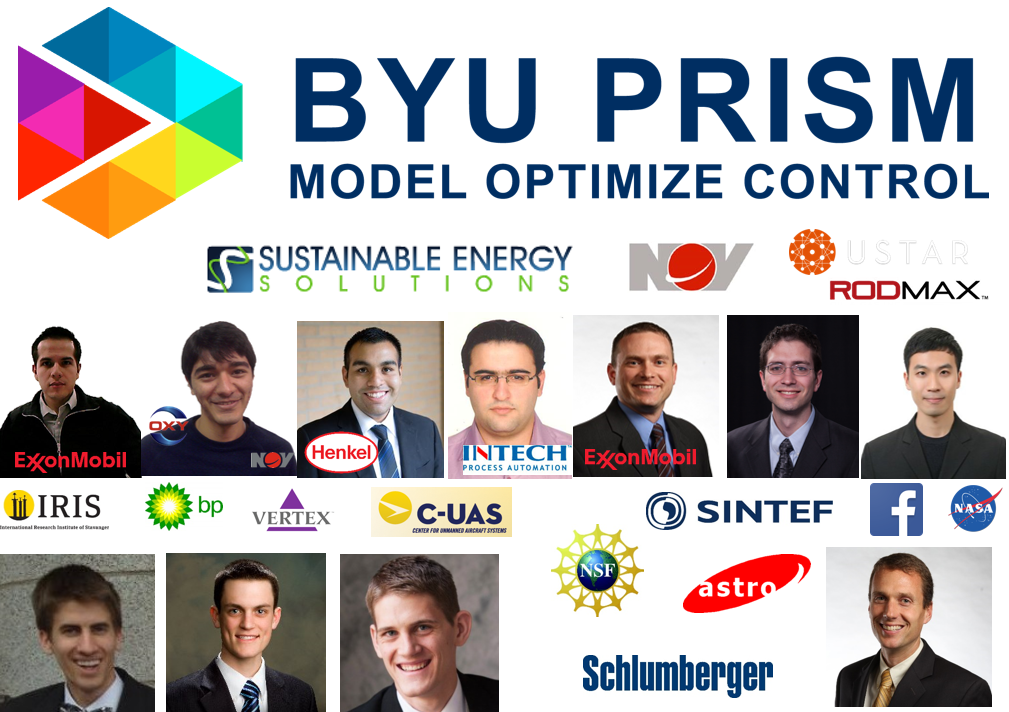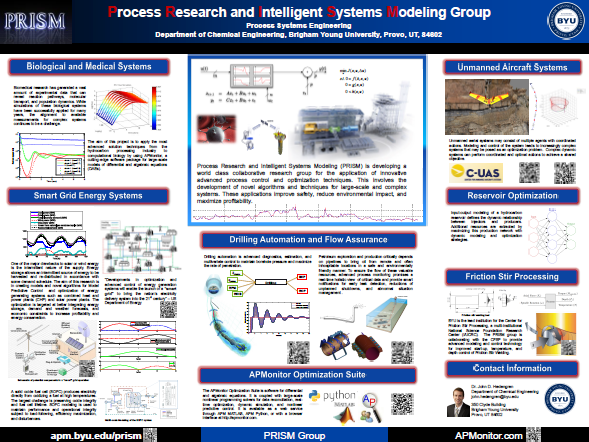PRISM Group at BYU
Main.HomePage History
Hide minor edits - Show changes to markup
Process Research and Intelligent Systems Modeling (PRISM) is a collaborative research group for the application of innovative advanced process control, optimization, cybersecurity, estimation, digital twin modeling, machine learning, and data science
Process Research and Intelligent Systems Modeling (PRISM) is a collaborative research group for the application of innovative advanced process control, optimization, cybersecurity, estimation, digital twin modeling, machine learning, and data science.
Process Research and Intelligent Systems Modeling (PRISM) is a collaborative research group for the application of innovative advanced process control, optimization, cybersecurity, estimation, digital twin modeling, machine learning, and data science applied to:
Process Research and Intelligent Systems Modeling (PRISM) is a collaborative research group for the application of innovative advanced process control, optimization, cybersecurity, estimation, digital twin modeling, machine learning, and data science
BYU PRISM Newsletter (December 2021) Δ
Some of the recent research applications include:
John Hedengren leads the BYU PRISM group with interests in combining data science, optimization, and automation. He earned a doctoral degree at the University of Texas at Austin and worked 5 years with ExxonMobil Chemical prior to joining BYU in 2011. He served as a Society of Petroleum Engineers (SPE) Distinguished Lecturer for 2018-2019 and completed a sabbatical in 2020 to collaboratively develop combined physics-based and machine learned methods for optimization and automation. The online courses on programming, optimization, dynamics, control, and machine learning are accessed by 10,000 learners each day. The Temperature Control Lab (TCLab) is used at 70 universities and by 3000 professionals to learn programming, data science, dynamics, and control.
John Hedengren leads the BYU PRISM group with interests in combining data science, optimization, and automation. He earned a doctoral degree at the University of Texas at Austin and worked 5 years with ExxonMobil Chemical prior to joining BYU in 2011. He served as a Society of Petroleum Engineers (SPE) Distinguished Lecturer for 2018-2019 and completed a sabbatical in 2020 to collaboratively develop combined physics-based and machine learned methods for optimization and automation. The online courses on programming, optimization, dynamics, control, and machine learning are accessed by 10,000 learners each day. The Temperature Control Lab (TCLab) is used at 70 universities and by 3000 professionals to learn programming, data science, dynamics, and control.
 | John Hedengren leads the BYU PRISM group with interests in combining data science, optimization, and automation. He earned a doctoral degree at the University of Texas at Austin and worked 5 years with ExxonMobil Chemical prior to joining BYU in 2011. He served as a Society of Petroleum Engineers (SPE) Distinguished Lecturer for 2018-2019 and completed a sabbatical in 2020 to collaboratively develop combined physics-based and machine learned methods for optimization and automation. The online courses on programming, optimization, dynamics, control, and machine learning are accessed by 10,000 learners each day. The Temperature Control Lab (TCLab) is used at 70 universities and by 3000 professionals to learn programming, data science, dynamics, and control. |

John Hedengren leads the BYU PRISM group with interests in combining data science, optimization, and automation. He earned a doctoral degree at the University of Texas at Austin and worked 5 years with ExxonMobil Chemical prior to joining BYU in 2011. He served as a Society of Petroleum Engineers (SPE) Distinguished Lecturer for 2018-2019 and completed a sabbatical in 2020 to collaboratively develop combined physics-based and machine learned methods for optimization and automation. The online courses on programming, optimization, dynamics, control, and machine learning are accessed by 10,000 learners each day. The Temperature Control Lab (TCLab) is used at 70 universities and by 3000 professionals to learn programming, data science, dynamics, and control.
 | John Hedengren leads the BYU PRISM group with interests in combining data science, optimization, and automation. He earned a doctoral degree at the University of Texas at Austin and worked 5 years with ExxonMobil Chemical prior to joining BYU in 2011. He served as a Society of Petroleum Engineers (SPE) Distinguished Lecturer for 2018-2019 and completed a sabbatical in 2020 to collaboratively develop combined physics-based and machine learned methods for optimization and automation. The online courses on programming, optimization, dynamics, control, and machine learning are accessed by 10,000 learners each day. The Temperature Control Lab (TCLab) Arduino microcontroller is used at 70 universities and by 3000 professionals to learn programming, data science, dynamics, and control. |
 | John Hedengren leads the BYU PRISM group with interests in combining data science, optimization, and automation. He earned a doctoral degree at the University of Texas at Austin and worked 5 years with ExxonMobil Chemical prior to joining BYU in 2011. He served as a Society of Petroleum Engineers (SPE) Distinguished Lecturer for 2018-2019 and completed a sabbatical in 2020 to collaboratively develop combined physics-based and machine learned methods for optimization and automation. The online courses on programming, optimization, dynamics, control, and machine learning are accessed by 10,000 learners each day. The Temperature Control Lab (TCLab) is used at 70 universities and by 3000 professionals to learn programming, data science, dynamics, and control. |
 | John Hedengren leads the BYU PRISM group with interests in combining data science, optimization, and automation. He earned a doctoral degree at the University of Texas at Austin and worked 5 years with ExxonMobil Chemical prior to joining BYU in 2011. He served as a Society of Petroleum Engineers (SPE) Distinguished Lecturer for 2018-2019 and completed a sabbatical in 2020 to collaboratively develop combined physics-based and machine learned methods for optimization and automation. The online courses on programming, optimization, dynamics, control, and machine learning are accessed by 10,000 learners each day. The Temperature Control Lab (TCLab) Arduino microcontroller is used at 70 universities and by 3000 professionals to learn programming, data science, dynamics, and control. |
 | John Hedengren leads the BYU PRISM group with interests in combining data science, optimization, and automation. He earned a doctoral degree at the University of Texas at Austin and worked 5 years with ExxonMobil Chemical prior to joining BYU in 2011. He served as a Society of Petroleum Engineers (SPE) Distinguished Lecturer for 2018-2019 and completed a sabbatical in 2020 to collaboratively develop combined physics-based and machine learned methods for optimization and automation. The online courses on programming, optimization, dynamics, control, and machine learning are accessed by 10,000 learners each day. The Temperature Control Lab (TCLab) Arduino microcontroller is used at 70 universities and by 3000 professionals to learn programming, data science, dynamics, and control. |
 | John Hedengren leads the BYU PRISM group with interests in combining data science, optimization, and automation. He earned a doctoral degree at the University of Texas at Austin and worked 5 years with ExxonMobil Chemical prior to joining BYU in 2011. He served as a Society of Petroleum Engineers (SPE) Distinguished Lecturer for 2018-2019 and completed a sabbatical in 2020 to collaboratively develop combined physics-based and machine learned methods for optimization and automation. The online courses on programming, optimization, dynamics, control, data science, and machine learning are accessed by 10,000 learners each day and the TCLab Arduino module is used at 70 universities. |
 | John Hedengren leads the BYU PRISM group with interests in combining data science, optimization, and automation. He earned a doctoral degree at the University of Texas at Austin and worked 5 years with ExxonMobil Chemical prior to joining BYU in 2011. He served as a Society of Petroleum Engineers (SPE) Distinguished Lecturer for 2018-2019 and completed a sabbatical in 2020 to collaboratively develop combined physics-based and machine learned methods for optimization and automation. The online courses on programming, optimization, dynamics, control, and machine learning are accessed by 10,000 learners each day. The Temperature Control Lab (TCLab) Arduino microcontroller is used at 70 universities and by 3000 professionals to learn programming, data science, dynamics, and control. |
 | John Hedengren leads the BYU PRISM group with interests in combining data science, optimization, and automation. He earned a doctoral degree at the University of Texas at Austin and worked 5 years with ExxonMobil Chemical prior to joining BYU in 2011. He served as a Society of Petroleum Engineers (SPE) Distinguished Lecturer for 2018-2019 and completed a sabbatical in 2020 to collaboratively develop combined physics-based and machine learned methods for optimization and automation. His online courses are accessed by 10,000 learners each day and the TCLab Arduino module is used at 70 universities. |
 | John Hedengren leads the BYU PRISM group with interests in combining data science, optimization, and automation. He earned a doctoral degree at the University of Texas at Austin and worked 5 years with ExxonMobil Chemical prior to joining BYU in 2011. He served as a Society of Petroleum Engineers (SPE) Distinguished Lecturer for 2018-2019 and completed a sabbatical in 2020 to collaboratively develop combined physics-based and machine learned methods for optimization and automation. The online courses on programming, optimization, dynamics, control, data science, and machine learning are accessed by 10,000 learners each day and the TCLab Arduino module is used at 70 universities. |
 | John Hedengren leads the BYU PRISM group with interests in combining data science, optimization, and automation. He earned a doctoral degree at the University of Texas at Austin and worked 5 years with ExxonMobil Chemical prior to joining BYU in 2011. He served as a Society of Petroleum Engineers (SPE) Distinguished Lecturer for 2018-2019 and completed a sabbatical in 2020 to collaboratively develop combined physics-based and machine learned methods for optimization and automation. His online courses are accessed by 10,000 learners each day and the TCLab Arduino module is used at 70 universities. |
 | John Hedengren leads the BYU PRISM group with interests in combining data science, optimization, and automation. He earned a doctoral degree at the University of Texas at Austin and worked 5 years with ExxonMobil Chemical prior to joining BYU in 2011. He served as a Society of Petroleum Engineers (SPE) Distinguished Lecturer for 2018-2019 and completed a sabbatical in 2020 to collaboratively develop combined physics-based and machine learned methods for optimization and automation. His online courses are accessed by 10,000 learners each day and the TCLab Arduino module is used at 70 universities. |
 | John Hedengren leads the BYU PRISM group with interests in combining data science, optimization, and automation. He earned a doctoral degree at the University of Texas at Austin and worked 5 years with ExxonMobil Chemical prior to joining BYU in 2011. He served as a Society of Petroleum Engineers (SPE) Distinguished Lecturer for 2018-2019 and completed a sabbatical in 2020 to collaboratively develop combined physics-based and machine learned methods for optimization and automation. His online courses are accessed by 10,000 learners each day and the TCLab Arduino module is used at 70 universities. |
 | John Hedengren leads the BYU PRISM group with interests in combining data science, optimization, and automation. He earned a doctoral degree at the University of Texas at Austin and worked 5 years with ExxonMobil Chemical prior to joining BYU in 2011. He served as a Society of Petroleum Engineers (SPE) Distinguished Lecturer for 2018-2019 and completed a sabbatical in 2020 to collaboratively develop combined physics-based and machine learned methods for optimization and automation. His online courses are accessed by 10,000 learners each day and the TCLab Arduino module is used at 70 universities. |
The group includes graduate and undergraduate students who are taking a lead role in the specific applications mentioned above. The PRISM group also develops novel algorithms and techniques for large-scale and complex systems. These applications and techniques advance the area of Process Systems Engineering (PSE).
The group includes graduate and undergraduate students who are taking a lead role in data science, machine learning, optimization, estimation, and control applications. The PRISM group also develops novel algorithms and techniques for large-scale and complex systems. These applications and techniques advance the area of Process Systems Engineering (PSE).
 | John Hedengren leads the BYU PRISM group with interests in combining data science, optimization, and automation. He earned a doctoral degree at the University of Texas at Austin and worked 5 years with ExxonMobil Chemical prior to joining BYU in 2011. He served as a Society of Petroleum Engineers (SPE) Distinguished Lecturer for 2018-2019 and completed a sabbatical in 2020 to collaboratively develop combined physics-based and machine learned methods for optimization and automation. |
 | John Hedengren leads the BYU PRISM group with interests in combining data science, optimization, and automation. He earned a doctoral degree at the University of Texas at Austin and worked 5 years with ExxonMobil Chemical prior to joining BYU in 2011. He served as a Society of Petroleum Engineers (SPE) Distinguished Lecturer for 2018-2019 and completed a sabbatical in 2020 to collaboratively develop combined physics-based and machine learned methods for optimization and automation. His online courses are accessed by 10,000 learners each day and the TCLab Arduino module is used at 70 universities. |
 | John Hedengren leads the BYU PRISM group with interests in combining data science, optimization, and automation. He earned a doctoral degree at the University of Texas at Austin and worked 5 years with ExxonMobil Chemical prior to joining BYU in 2011. He served as a Society of Petroleum Engineers (SPE) Distinguished Lecturer for 2018-2019 and completed a sabbatical in 2020 to collaboratively develop combined physics-based and machine learned methods for optimization and automation. |
 | John Hedengren leads the BYU PRISM group with interests in combining data science, optimization, and automation. He earned a doctoral degree at the University of Texas at Austin and worked 5 years with ExxonMobil Chemical prior to joining BYU in 2011. He served as a Society of Petroleum Engineers (SPE) Distinguished Lecturer for 2018-2019 and completed a sabbatical in 2020 to collaboratively develop combined physics-based and machine learned methods for optimization and automation. |
 | John Hedengren leads the BYU PRISM group with interests in combining data science, optimization, and automation. He earned a doctoral degree at the University of Texas at Austin and worked 5 years with ExxonMobil Chemical prior to joining BYU in 2011. |
 | John Hedengren leads the BYU PRISM group with interests in combining data science, optimization, and automation. He earned a doctoral degree at the University of Texas at Austin and worked 5 years with ExxonMobil Chemical prior to joining BYU in 2011. He served as a Society of Petroleum Engineers (SPE) Distinguished Lecturer for 2018-2019 and completed a sabbatical in 2020 to collaboratively develop combined physics-based and machine learned methods for optimization and automation. |

John Hedengren leads the BYU PRISM group with interests in combining data science, optimization, and automation. He earned a doctoral degree at the University of Texas at Austin and worked 5 years with ExxonMobil Chemical prior to joining BYU in 2011.
 | John Hedengren leads the BYU PRISM group with interests in combining data science, optimization, and automation. He earned a doctoral degree at the University of Texas at Austin and worked 5 years with ExxonMobil Chemical prior to joining BYU in 2011. |
Increased computational resources and machine learning methods have triggered a new era of data science that has transformative potential across many fields, but these possibilities have yet to come to fruition because physics-based and other a priori information cannot be incorporated into the current machine learning algorithms. Hybrid machine learning developed in the BYU PRISM group overcomes current limitations by including physics-based activation functions and developing solver methods for hybrid deep learning.
Increased computational resources and machine learning methods have triggered a new era of data science that has transformative potential across many fields, but these possibilities have yet to come to fruition because physics-based and other a priori information cannot be incorporated into the current machine learning algorithms. Hybrid machine learning developed in the BYU PRISM group overcomes current limitations by including physics-based activation functions and developing solver methods for hybrid deep learning.

John Hedengren leads the BYU PRISM group with interests in combining data science, optimization, and automation. He earned a doctoral degree at the University of Texas at Austin and worked 5 years with ExxonMobil Chemical prior to joining BYU in 2011.
Process Research and Intelligent Systems Modeling (PRISM) is a world class collaborative research group for the application of innovative advanced process control, optimization, cybersecurity, estimation, digital twin modeling, machine learning, and data science applied to:
Process Research and Intelligent Systems Modeling (PRISM) is a collaborative research group for the application of innovative advanced process control, optimization, cybersecurity, estimation, digital twin modeling, machine learning, and data science applied to:
Increased computational resources and machine learning methods have triggered a new era of data science that has transformative potential across many fields, but these possibilities have yet to come to fruition because physics-based and other a priori information cannot be incorporated into the current machine learning algorithms. Hybrid machine learning developed in the BYU PRISM group overcomes current limitations by including physics-based activation functions and developing solver methods for hybrid deep learning.
- Fiber Optic Sensors
- Hybrid Nuclear Energy Systems
- Optimization Methods
Process Research and Intelligent Systems Modeling (PRISM) is a world class collaborative research group for the application of innovative advanced process control and optimization techniques to be applied to:
Process Research and Intelligent Systems Modeling (PRISM) is a world class collaborative research group for the application of innovative advanced process control, optimization, cybersecurity, estimation, digital twin modeling, machine learning, and data science applied to:
The group includes graduate and undergraduate students who are taking a lead role in the specific applications mentioned above. The PRISM group is also develops novel algorithms and techniques for large-scale and complex systems. These applications and techniques advance the area of Process Systems Engineering (PSE).
The group includes graduate and undergraduate students who are taking a lead role in the specific applications mentioned above. The PRISM group also develops novel algorithms and techniques for large-scale and complex systems. These applications and techniques advance the area of Process Systems Engineering (PSE).
Process Research and Intelligent Systems Modeling (PRISM) is a world class collaborative research group for the application of innovative advanced process control and optimization techniques to be applied to Computational biology, Drilling automation, Enhanced recovery of oil and gas reserves, Flow assurance, Sustainable energy systems, and Unmanned Aircraft Systems (UAS).
Process Research and Intelligent Systems Modeling (PRISM) is a world class collaborative research group for the application of innovative advanced process control and optimization techniques to be applied to:
- Computational biology
- Drilling automation
- Enhanced recovery of oil and gas reserves
- Flow assurance
- Sustainable energy systems
- Unmanned Aircraft Systems (UAS)
Process Research and Intelligent Systems Modeling (PRISM) is a world class collaborative research group for the application of innovative advanced process control and optimization techniques to be applied to:
- Computational biology
- Drilling automation
- Enhanced recovery of oil and gas reserves
- Flow assurance
- Sustainable energy systems
- Unmanned Aircraft Systems (UAS)
Process Research and Intelligent Systems Modeling (PRISM) is a world class collaborative research group for the application of innovative advanced process control and optimization techniques to be applied to Computational biology, Drilling automation, Enhanced recovery of oil and gas reserves, Flow assurance, Sustainable energy systems, and Unmanned Aircraft Systems (UAS).
- Drilling automation and flow assurance
- Biological and medical systems
- Sustainable energy systems
- Improved petrochemical manufacture
- Enhanced recovery of oil and gas reserves
- Unmanned Aerial Vehicle (UAV) control
- Computational biology
- Drilling automation and flow assurance
- Enhanced recovery of oil and gas reserves
- Sustainable energy systems
- Unmanned Aircraft Systems (UAS)
The group includes graduate and undergraduate students who are taking a lead role in the specific applications mentioned above. The PRISM group is also develops novel algorithms and techniques for large-scale and complex systems. These applications and techniques provide meaningful advancements in the area of Process Systems Engineering (PSE).
The group includes graduate and undergraduate students who are taking a lead role in the specific applications mentioned above. The PRISM group is also develops novel algorithms and techniques for large-scale and complex systems. These applications and techniques advance the area of Process Systems Engineering (PSE).
Process Research and Intelligent Systems Modeling (PRISM) is developing a world class collaborative research group for the application of innovative advanced process control and optimization techniques to be applied to:
Process Research and Intelligent Systems Modeling (PRISM) is a world class collaborative research group for the application of innovative advanced process control and optimization techniques to be applied to:
The group includes graduate and undergraduate students who are taking a development role in the specific applications mentioned above. The PRISM group is also involved in the development of novel algorithms and techniques for large-scale and complex systems. These applications and techniques have the common objective of providing meaningful advancements in the area of Process Systems Engineering (PSE).
The group includes graduate and undergraduate students who are taking a lead role in the specific applications mentioned above. The PRISM group is also develops novel algorithms and techniques for large-scale and complex systems. These applications and techniques provide meaningful advancements in the area of Process Systems Engineering (PSE).
Announcements
- Control Engineering Practice (CEP) Special Issue
- Topic: Applications of advanced process control technology on industrial systems Δ
- Submission Due Date: August 15, 2012
- PRISM Group Visitors
- Jeff Renfro (Honeywell) - March 8, 2012 Δ
- Mark Darby (CMiD Solutions) - March 13-14,2012

